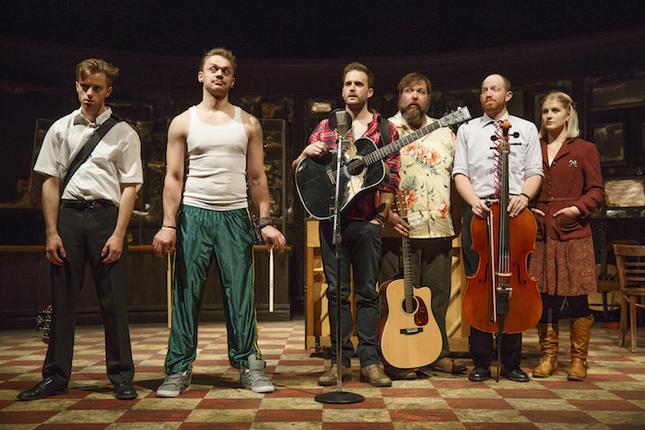A One-of-a-Kind Show in ‘Once’
By • August 17, 2015 0 686

If you see “Once,” the award-laden, almost fabled musical show now in town at the Kennedy Center’s Eisenhower Theater through August 16, once might not be enough given the amount of pure and unalloyed original pleasure it gives an audience.
I call it a musical show because both strictly and loosely speaking, this musical, based on a slight but critically acclaimed indie film about a lovelorn, struggling Irish busker musician who finds inspiration when he meets a young Czech emigrant in a Dublin bar, doesn’t behave like any sort of musical Broadway musical anyone might be used to from R&H, to Cole Porter, to Sondheim and “Cats” and the green witches of “Wicked”.
It’s a true one-of-a-kind, which made it from the original film directed by John Carney by starring Glen Hansard and Marketa Irglova as characters named simply “Boy” and “Girl,” to an Off-Broadway incarnation and a Broadway smash that won a load of Tony Awards and now appears as very successful road company version.
It’s probably not everyone’s cup of Guinness—we heard one older couple walk away with the man grumbling that “well, at least we can’t say we didn’t try something new.”
Even though its been around a while now, new it is nevertheless, a musical theater piece as an experience, which may be an indicator of one of the future road stops of producers and artists seeking to entice new and younger audience.
For sure it’s a great opp if not app for being part of the show for anyone who’s missed out on wandering into an Irish pub—a la the local Kelly’s Irish Times, the Dubliner of Nanny O’Briens—here’s your chance to step up to the bar on stage, and meet a crew of gifted musicians who have gathered on stage to jump around, play fiddles and squeeze boxes and accordions, guitars and violins. New it is, with all sorts of opportunities. It’s an experience that allows the audience to warm up to the show and its people, as well for the musicians themselves to warm up.
Here’s a play—and it is a play, given that the gifted Irish playwright Enda Walsh has written the book—in which music is the heart and soul of things, integral to the characters and the situation, the singing and the songs and the playing flow naturally from the story and the setting. What else would you expect to find in a Dublin pub except musicians ready to stand up and sing and play without much need for prodding?
The set up—it may have been slight and endearing in the film, but is a little more expansive on stage—is that “boy”—the charismatic Stuart Ward—is at song’s end after being dumped by his yearned-for girlfriend who’s fled to America. He’s lost his ability to find his heart—which appears broken—with his music. Instead, he’s living upstairs with his “da,” making a bare living as a Hoover repairman. The pub—how odd—seems full of all sorts of characters, including boy’s beefy bearded pal looking for love, and a group of Czech expats who seem both out of place and right at home, not to mention sundry others, including a banker who plays pop-rock cello.
There is also the “girl,” an endearing, hope-filled single mother who encourages him and inspires him, and perhaps and probably, even loves him, and who saves his soul, music and all.
It’s a thin, flimsy setup, but on stage, it contains a world. Every one of the characters play an instrument—“boy” goes guitar, “girl” is light and self-contained on the piano. The songs and the music—by the original film stars Glen Hansard and Marketa Irglova—are never far away, and they seduce, inveigle, invite and finally kidnap the audience.
The play is fully alive, and fully aware, and if the presence of Czechs and the Irish seems both whimsical and a little odd, to resist this mix and mingling is like insisting on a purebred dog at a shelter. It’s both heartless and beside the point.
The songs showcase not only the central characters, they invite every one on stage in a little at a time, especially in the just famous “Falling Slowly” (it won an Oscar) and which is reprised in the second act, and in “Gold”. Here you see, one by one, the fiddler, the accordionist, the violinist rise and rise, for a song that “boy” has written, a moment of solidarity that speaks mightily to the world of street musicians or buskers, as well as the tribe that contains the music world.
“Once” has a generous spirit, made heartwarming and welcomingly soggy by the predicament of the couple, who have unfinished business with others. The two principals embody that spirit—Ward is manly and appealing, and a little slow when confronted with such an obvious find as the “girl,” but when he finally dives into his music, he is a growling, impassioned singer and player. Dani der Wall, blonde slight, blonde, fearless, pushy in an attractive way, is an absolutely delight, no matter what she does—move across the stage, trade quips with everyone, playing the piano (“you have to say hello to it,” she insists).
This may sound sentimental and a little hokey and if that’s the way you feel, the bartender should cut you off. You haven’t had enough.
“Once” and the sweet, too-smart and cool “South Park”-made “The Book of Mormon” next door at the Opera House are packing them in at the Kennedy Center. They may be portents of the future for future audiences—but then again, they may not. They seem one-of-a-kind, impossible to imitate. But “Once” has seemed to have found a kind of music—folkish, gaelic, rock-and-poppish and dance and movement inducing—that may provide the core for future musicals on Broadway.

